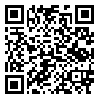

BibTeX | RIS | EndNote | Medlars | ProCite | Reference Manager | RefWorks
Send citation to:
URL: http://rbs.mui.ac.ir/article-1-711-en.html
2- Department of psychology, Dezful Branch, Islamic Azad University, Dezful, Iran. , Dr_sarraj@yahoo.com
3- Department of psychology, Ahvaz Branch, Islamic Azad University, Ahvaz, Iran.
4- Endodontist, Fellowship in Hospital Dentistry ,Dental Research Center, Dental Research Institute, School of Dentistry, Isfahan University of Medical Sciences ,Isfahan, Iran.
5- Dental Research Center, Department of Oral Public Health Dental Research Institute, School of Dentistry, Isfahan University of Medical Sciences ,Isfahan, Iran.
Aim and Background: Dental anxiety is one of the important reasons for people to avoid dental care. The exacerbation of symptoms can be due to difficulty in cognitive emotion regulation; therefore, treatment is needed to improve cognitive emotion regulation and to reduce symptoms; Therefore, the purpose of the present study was to determine the effectiveness of acceptance and commitment based therapy on cognitive emotion regulation and severity of symptoms in Dental Anxiety Patients.
Methods and Materials: A clinical trial study was performed on patients with dental anxiety. Thirty-two patients were randomly assigned to the experimental and control groups. The experimental group participated in 10 weekly sessions of 90 minutes for two and a half months under acceptance and commitment based on the Hayes model presented. The control group was on the waiting list. Dental Anxiety Questionnaire (DAI) and Cognitive Emotion Regulation Questionnaire were used to evaluate the dependent variables and the questionnaire (SCL-90-R) and pulse oximeter were used as screening tools. Data were analyzed by repeated measures ANOVA using SPSS software.
Findings: According to the results, the mean and standard deviation of dental anxiety in the pretest of the experimental group was 121.3 ± 10.5 which were upgraded to post-test and follow-up respectively 89.1 ± 7.8 and 87.9 ± 8.1 which was statistically significant (P<0.0001). Also the mean and standard deviation of positive cognitive adjustment in the pretest of the experimental group was 41.12 ± 5.40 which were upgraded to post-test and follow-up respectively 46.81 ± 5.75 and 47.37 ± 5.80 which was statistically significant (P<0.0001). Mean and standard deviation of negative cognitive adjustment in pretest of experimental group was 30.37 ± 3.51 which were upgraded to post-test and follow-up respectively 34.37 ± 4.22 and 35.31 ± 3.87 which was statistically significant (P<0.0001). In addition, the difference between dental anxiety scores, positive cognitive emotion regulation strategies, and negative cognitive emotion regulation strategies in the three stages of pre-test, post-test and follow-up in the whole study sample and the difference scores of these variables in the three stages of the study were significant in the two groups (p<0.0001).
Conclusion: Acceptance and commitment therapy is a promising intervention to improve cognitive emotion regulation and reduce the severity of symptoms of dental anxiety patients.
Received: 2020/04/16 | Accepted: 2020/04/16 | Published: 2020/04/16
| Rights and permissions | |
 |
This work is licensed under a Creative Commons Attribution-NonCommercial 4.0 International License. |





